When the clock was ticking on time-sensitive runway overlay project work in the remote Pacific Islands, civil construction specialists McConnell Dowell looked to the reliability and efficiency of milling and paving products from within the Wirtgen group stable to get the job done.
For most of us, any mention of the Pacific Islands conjures up images of pristine beaches, gentle rolling surf and drinks beside the pool.
But for McConnell Dowell Constructors the vast Pacific region, incorporating far-flung islands and atolls and myriad cultures, is a hugely important market and it has developed a successful portfolio of operational skills there over 25-plus years.
McConnell Dowell is one of the largest contractors in the Pacific with projects currently being undertaken in American Samoa, the Cook Islands, Kiribati, Tonga and Tuvalu.
Air travel is the primary connection across the Pacific region and each nation’s main airport is of vital importance. So it is not surprising that runway remediation and overlay work is of paramount importance. Maintenance is required across 10- to 15-year cycles in order to ensure runway surfaces meet international standards.
Among the company’s current projects are runway overlay operations at Fua’amotu International Airport in Tonga and at Bonriki International Airport in Tawara, Kiribati.
To help complete these twin projects some 2800 kilometres (or 1515 nautical miles) apart, McConnell Dowell invested in milling and paving technology from the WIRTGEN GROUP.
Supplied and serviced through WIRTGEN NEW ZEALAND, the powerful combination of a WIRTGEN W150 large milling machine and VÖGELE Super 1800-3 ‘Universal’ class tracked paver were chosen for deployment to each destination following a rigorous selection process.
Michael Buckland, McConnell Dowell’s construction manager for the Pacific, says a number of factors counted in favour of the WIRTGEN and VÖGELE machines.
“Projects such as these are capital intensive programmes for us, so all plant procured for the job needs to meet a number of performance criteria.”
“We look to well-respected brands that boast good efficiencies in terms of output quality, running, maintenance costs and reliability. We need world-class parts and technical support and we look for machines that hold their value; something WIRTGEN and VÖGELE equipment is renowned for.”

“It’s natural to review ownership trends within the industry when assessing plant procurement and it’s plain to see machinery from within WIRTGEN NEW ZEALAND’s line-up enjoys a solid reputation.”
The tropics might be ideal for holidaymakers, but they are tough on machinery, with salt air making for a very corrosive environment.
There is constant heat and humidity; between 32 and 36 on average every day on Kiribati for example, with 85-90 percent humidity.
The runway at Bonriki International Airport is 2130 metres long and 45 metres wide and, by project’s end the McConnell Dowell crew will have overlaid 30,000 ton of material. A similar volume will have been laid at Fua’amotu International Airport in Tonga, making both of these projects substantial in scale.
In order to provide aggregate McConnell Dowell has its own mobile crushing plant in Tonga (along with a similar plant in American Samoa where the Auckland-headquartered company is also working on runway remediation at Pago Pago), while at Kiribati aggregate is brought onto the island by barge.
The Tonga- and Kiribati-based WIRTGEN W150 milling machines offer their respective crews a 1500mm milling width and between zero and 320mm milling depth. The powerful Cummins QSL 9 six cylinder power pack delivers 261kW (350hp) while still boasting efficient fuel burn and EU Stage 3a emissions.
The popular and innovative VÖGELE Super 1800-3 tracked paver has likewise proved its worth in the Pacific. The ‘dash three’ features a 10-metre maximum pave width, with a laydown rate of up to 700 tons/hour.
“McConnell Dowell’s investment in WIRTGEN and VÖGELE machinery for these unique and time-sensitive projects offers up a very tangible validation of the robustness of our engineering technology in these challenging environments,” says WIRTGEN NEW ZEALAND general manager, Richard Seay
“Trusting in the reliability of the machinery is only part of the equation though; the ability for WIRTGEN NEW ZEALAND to continue to offer comprehensive parts and service support – even to remote corners of the Pacific – gives customers like McConnell Dowell peace of mind.”
“It’s a relationship we’re immensely proud to be an active and continuing part of.”
Michael Buckland says an emergency part can be on location within three days (each McConnell Dowell crew has its own mechanic). Although with brand new machinery on-site sporting a track record for reliability, this contingency is something that is meticulously planned for, but rarely deployed.
“Parts support and the machine commissioning process were all part of our pre-purchase evaluation programme.”
“The other factor we had to take into consideration is that, with such innovative machines, we need a consistent link to expertise within WIRTGEN’s operation.”
WIRTGEN NEW ZEALAND technician and trainer Mitchell Collis has recently made a scheduled service and training trip to McConnell Dowell’s project site at Bonriki International Airport, Kiribati.
“There’s a lot more to supporting machinery such as the WIRTGEN W150 and VÖGELE Super 1800-3 than simply checking filters, oil and telematic data, especially in these challenging conditions,” says Collis.
He was also instrumental in commissioning these machines for McConnell Dowell before they left New Zealand.
“Application training is a big part of the role; along with our Australian-based trainer Chris Adams we’ve taken the guys on the paver crews through training on the screed, for example, as well as setting up the milling machines for grade and slope control,” says Collis.
“As you can imagine there are also logistical challenges with regard to ensuring the McConnell Dowell teams in Tonga and Kiribati have a ready supply of consumables and small parts available to them on-site.”
“Despite the distances, there are regular flights which allow us to get anything we need up there pretty rapidly.”
The regularity of flights – along with the potential for unscheduled arrivals – plays a huge part in McConnell Dowell’s project programmes in Tonga and Kiribati. Completed strictly at night, the methodology for the runway remediation work revolves around certain windows of activity.
In Tonga, Fua’amotu International Airport sees a lot of traffic, necessitating McConnell Dowell’s team only work four nights out of seven. With less air traffic heading to Kiribati, the construction entity’s team at Bonriki International Airport are able to work seven nights a week.

“The biggest challenge to how we schedule work is the ‘unknown’ or emergency flight. We constantly have to be prepared to remove crews and machinery from the runway in the event of a long haul flight being diverted into Tonga or Kiribati,” says Michael Buckland.
“Similarly, our team in Tonga must wait for an hour after the last scheduled flight has departed before commencing their shift, just in case that flight is forced to turn around and head back to Fua’amotu International for any reason.”
“These contingencies make tight timeframes even tighter, so as you can imagine we need every single machine and every single team member to work as efficiently and consistently as possible when the opportunities are available to us.”
The intricacies of runway reconstruction work in the challenging Pacific environment demand thorough research and contingency planning. And as McConnell Dowell has proven, this re-search and planning extends to choosing reliable plant and technical support.
“If you select well, you mitigate issues,” Buckland concludes.
“Assessing the market and making a thoroughly researched and informed decision on frontline plant can be crucial to a project’s success, regardless of where in the world it might be heading.”




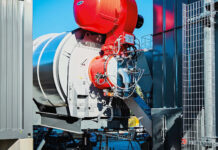
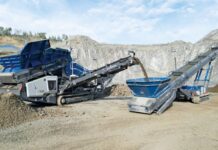

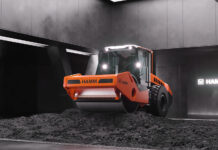
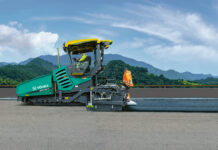
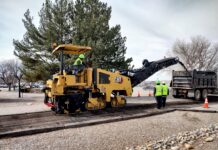
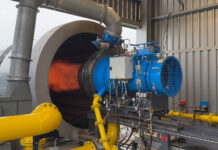
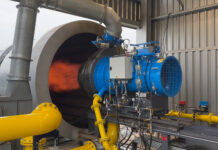
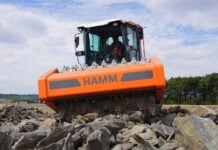
 Copyright 2017-2023 All rights reserved.
Copyright 2017-2023 All rights reserved.